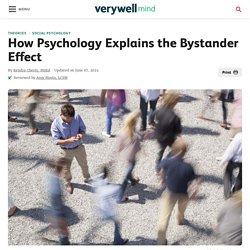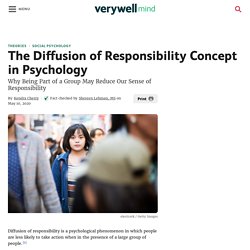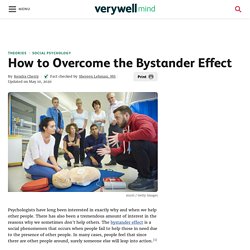

What Is the Bystander Effect? If you witnessed an emergency happening right before your eyes, you would certainly take some sort of action to help the person in trouble, right?

While we might all like to believe that this is true, psychologists suggest that whether or not you intervene might depend upon the number of other witnesses present. The Science of Empathy. How Diffusion of Responsibility Affects Group Behavior. Diffusion of responsibility is a psychological phenomenon in which people are less likely to take action when in the presence of a large group of people.1 For example, imagine that you are in a large city on a bustling street.

You notice a man fall to the ground and start convulsing as if having a seizure. Many people turn and look at the man, but no one moves to help or call for medical assistance. Why? Because there are so many people present, no one person feels pressured to respond. Ethics Defined: Diffusion of Responsibility.
Group inhibition of bystander intervention in emergencies. Bystander intervention in emergencies; Diffusion of responsibility. The bystander effect and social; control behavior the effect of the presence of others on people’s reactions to norm violations. The Bystander Effect A Meta Analytic Review on Bystander Intervention. THE BYSTANDER EFFECT. How to Overcome the Bystander Effect. Psychologists have long been interested in exactly why and when we help other people.

There has also been a tremendous amount of interest in the reasons why we sometimes don't help others. The bystander effect is a social phenomenon that occurs when people fail to help those in need due to the presence of other people. In many cases, people feel that since there are other people around, surely someone else will leap into action.1 While the bystander effect can have a negative impact on prosocial behavior, altruism and heroism, researchers have identified a number of different factors that can help people overcome this tendency and increase the likelihood that they will engage in helping behaviors.2 Some of these include: Witnessing Helping Behavior Sometimes just seeing other people doing something kind or helpful makes us more willing to help others. Imagine that you are walking into a large department store. Being Observant Being Skilled and Knowledgeable Guilt Feeling Good. The Bystander Effect - You Can Break the Cycle.
Overcoming the Bystander Effect. Have you ever been a hero? Going about our daily routines, few of us have the opportunity to save a life or disrupt a crime in progress—fewer still take that opportunity when it presents itself. I once witnessed a car accident in which the guilty party leapt from his disabled vehicle and fled the scene. I quickly pulled over and dialed 911.
Fortunately, another passerby stopped and apprehended the suspect. The culprit—who was clearly intoxicated—struggled to escape, but he was easily overpowered. Not only are acts of heroism unsurprisingly rare, reports about observers who, out of indifference or perplexity, fail to report criminal behavior or respond to emergencies with inaction are common. Psychologists Bibb Latané and John Darley identified a pattern of behavior they called the bystander effect, which they demonstrated in their labs for the first time in 1968. Overcoming the Bystander Effect. Helping Kids Overcome the Bystander Effect.
Newscasters love to share stories of kids as young as three years old calling 911 to save a parent’s life.

These stories bear out what research has shown us: Very young children have a propensity to be kind and helpful. Starting as early as 18 months, studies show, toddlers spontaneously help an adult who is unable to pick up something he dropped or finds himself in a similarly tricky situation. Being kind at a cost to themselves makes two year olds happy, and three year olds who cooperate on a task share rewards even when they don’t have to. But a recent study suggests that, like adults, kids are also subject to a major obstacle to helping: the bystander effect.
How to be kinder to strangers in Singapore, Opinion News. The Charities Aid Foundation recently released the World Giving Index 2017, which provides insight into the scope and nature of giving around the world. Based on data collected from the Gallup World Poll, the index, which polled 1,000 individuals in each representative country, revealed two surprising facts. Myanmar, Indonesia and Kenya turned out to be among the most charitable countries, even though they have a huge number of their populations living below the poverty line. Being poor does not stop one from being generous. Wealthy countries such as the United States, Canada, New Zealand, Australia and the United Arab Emirates also feature in the top 10. Myanmar, the top country for four years in a row, has a poor human rights record, in part because of its treatment of the Rohingya Muslims. Singapore, ranked 30, is behind Indonesia (2), Myanmar (1) and Thailand (15), but streets ahead of Cambodia (134), Vietnam (116) and the Philippines (54) in Asean.
Changing our mindset.